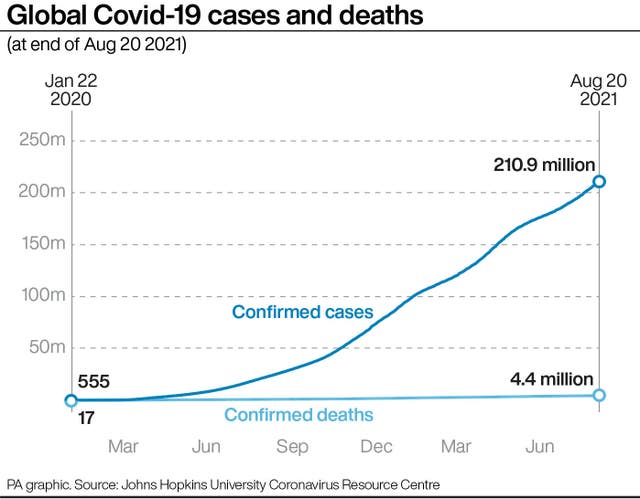The UK must not take its “eye off the ball” with coronavirus (Covid-19) vaccinations, an expert has said as he warned the virus could come “roaring back”.
“Strategic”
Dr Chris Smith, consultant virologist and lecturer at Cambridge University, said a decision on booster jabs should not be “rash, (or) rushed”, and that the government is considering a more “strategic” approach. It comes as health secretary Sajid Javid said he is “confident” a booster vaccine campaign can start next month despite reports that experts want more time to consider whether they are needed.
Speaking on BBC Breakfast, Dr Smith said:
We all agree that (the pandemic) is not over until it is over in every corner of the world, because otherwise it will just come roaring back. Don’t forget we think that this started with a handful of cases in one city, in one corner of one country… and it then eclipsed the entire world.
But one must not take one’s eye off the ball here because it would be very easy to unstitch all of the good work we’ve done so far if it turns out with time we do lose immunity because the vaccines wane in their effectiveness.
As we go into winter, now is a critical period and I think that is why we haven’t seen a rash, rushed decision by the JCVI (Joint Committee on Vaccination and Immunisation) and the Government.

The UK’s vaccination programme has so far seen around three-quarters of adults fully vaccinated with two doses. NHS plans are in place to enable a rollout of third doses from 6 September alongside flu vaccines. Unlike in other countries such as Israel, no official decision on the booster programme has yet been taken.
It comes as research found more than three-quarters of adults in every age group say they would be likely or very likely to get a booster jab if offered. Overall, 87% of adults surveyed by the Office for National Statistics said they would be likely or very likely to get a third coronavirus jab. Likelihood increased with age, with 96% of those aged 70 and over indicating their interest, down to 78% of 16 to 29-year-olds.
Boosters
Dr Smith said although interventions in certain demographics may be more “strategic”, a decision on a booster campaign rollout needs to be made soon. He said:
While other countries are embarking on booster programmes, people are taking stock, they are looking at the data and maybe making a decision on how to intervene strategically in certain groups. They’re going to have to make a decision soon because winter is soon going to be upon us and it takes time for the programme to be rolled out and it takes time for the vaccines to actually have their effects in these people.
The World Health Organization (WHO) has argued that the priority should be ensuring people around the world are vaccinated rather than boosting the immunity of those already vaccinated. According to Nature:
The World Health Organization (WHO) has called for a moratorium on COVID-19 boosters until the end of next month, with the aim of ensuring that at least 10% of people in all countries are vaccinated before extra doses are handed out. …
the case for boosters has not yet been proved. Most COVID-19 vaccines currently in use remain extremely effective months after administration, particularly against severe disease and death. In a period of vaccine scarcity, the choice to dole out boosters must be guided by evidence of benefit, and consideration given to the cost of delaying the delivery of vaccines to vulnerable people and health-care workers in other countries.
If vaccination levels around the world remain high, then the odds of a new variant emerging also remain high. The risk then is that a variant emerges which evades current vaccines.















